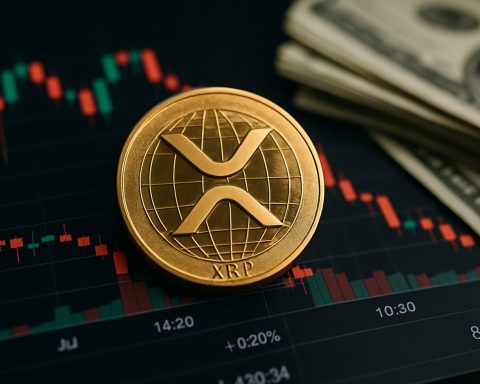- Ripple is navigating tensions between financial innovation and regulatory inertia in the UK.
- UK banks remain cautious and hesitant in embracing digital currencies like XRP, lacking clear regulatory guidance.
- Europe moves ahead with new MiCA regulations, enhancing demand for digital assets and leading innovation over the UK.
- Ripple is shifting focus to the US, pursuing a more favorable regulatory environment with 75% of new roles aimed there.
- The Financial Conduct Authority’s stringent standards pose challenges for crypto firms seeking approval in the UK.
- Ripple remains committed to the UK, urging it to adopt a more proactive stance in crypto regulation to avoid falling behind.
In the dynamic and fast-paced world of digital currencies, few realize the lurking tension between financial revolution and regulatory inertia. Picture the scene in London—a city known for its financial might yet caught in a web of caution as it grapples with the blockchain boom, all while Ripple, a beacon of digital payments innovation, eyes the future with anticipation and frustration.
Ripple, the trailblazer behind the cryptocurrency XRP, is navigating choppy waters in the UK, where the banks are as elusive as the morning fog over the Thames. Ripple’s leadership voices mounting unease over the country’s hesitant dance with crypto regulation. The heart of the matter? The British banks’ reticence to embrace the digital currency wave, stymied by regulatory clarity that remains as murky as ever.
At a recent summit, Cassie Craddock, Ripple’s UK and Europe chief, painted a vivid picture of unrealized potential, where hope drifts only to be tethered by uncertainty. Ripple’s attempts to engage with major financial institutions have often left her staring at an unanswered phone—a story that echoes from 2017, where initial interest fizzled into silence as quickly as London rain evaporates under the sun.
Contrast this with the continental view. Across the Channel, Europe strides ahead, basking in the new Markets in Crypto-Assets (MiCA) regulations. Here, financial entities are not just listening—they’re acting. Demand for digital assets burgeons, transforming the landscape and urging platforms like Ripple forward. Yet, on the UK side, banks stand on the precipice of innovation, hesitant, knuckles white with caution, unsure of what lies below.
Ripple’s Chief Executive, Brad Garlinghouse, is pivoting strategically towards the United States, where the regulatory climate under recent administrations has been more welcoming. A significant 75% of Ripple’s new roles are earmarked for the US, showcasing a deliberate shift towards a more fertile regulatory ground, while the UK remains a land of untapped possibilities.
Despite this transatlantic pivot, Ripple remains committed to the UK, an island nation steeped both in history and, now, in cautious progression. The challenge? Gaining approval from the Financial Conduct Authority (FCA), an entity known for its selective nods—accepting a mere 14% of the crypto firms that knock at its door, a statistic that echoes the stringent anti-money laundering standards in place.
As the UK tentatively resumes its journey towards a comprehensive crypto regulatory framework, Ripple embodies the crossroads of old-world caution and new-world vision, a testament to the complex tapestry of modern finance. For the thousands navigating this digital frontier, Ripple acts as both guide and pioneer, urging the UK to catch the wave lest it falls behind in the race for crypto supremacy.
The takeaway? In a world where information travels at the speed of light, standing still is falling behind. The UK finds itself on the cusp of innovation yet must decide if it will leap forward or let the opportunity drift past, caught only in the ripples of history’s forward march.
Will the UK Embrace the Ripple Effect? Unveiling the Future of Crypto Regulation
Understanding Ripple’s Stance in the Global Crypto Landscape
In the bustling realm of digital currencies, Ripple’s story unfolds like a captivating saga, navigating the tension between innovation and regulation. While London, a city synonymous with financial power, hesitates to fully embrace the crypto revolution, Ripple moves strategically, eyeing opportunities across different continents.
Ripple: A Brief Overview
Ripple, the mastermind behind XRP, seeks to revolutionize cross-border payments by offering faster, cheaper, and more reliable transactions. Founded in 2012, Ripple’s technology leverages blockchain to facilitate immediate and secure global payments. Despite its groundbreaking innovations, Ripple faces a challenging landscape in the UK, hindered by vague regulatory frameworks and cautious banking attitudes.
How-To Steps to Understanding Ripple’s Strategy
1. Study Ripple’s Technology: Learn about the blockchain technology behind Ripple, which assures transaction speed and security. RippleNet, the decentralized global network, allows for quicker payment processing compared to traditional methods.
2. Follow Global Regulatory Trends: Keep up with regulatory approaches in various parts of the world. Europe’s MiCA regulations serve as an example of progressive crypto policies supporting digital asset growth.
3. Monitor Ripple’s Strategic Shifts: Watch Ripple’s move towards the US, where regulatory climates are increasingly supportive, and observe how this might set precedents for other nations.
Real-World Use Cases of Ripple
Ripple’s technology isn’t merely theoretical. It powers real-world applications like facilitating cross-border payments for remittances, reducing transaction costs significantly for financial institutions, and enabling instantaneous fund transfers across different jurisdictions.
Market Forecasts & Industry Trends
Ripple’s strategic focus on the US and its pioneering stance in Europe might predict shifting sands in international finance. As nations grapple with creating robust crypto regulations, Ripple’s agility allows it to tap into evolving markets, suggesting that countries aligning with crypto innovations will likely surge ahead economically.
Reviews & Comparisons
– Ripple vs. Traditional Banks: Ripple’s blockchain solution offers faster processing times and reduced fees compared to conventional banking transactions.
– Ripple vs. Competitors: Unlike bitcoin, which is primarily a store of value, Ripple focuses on facilitating transactions, making it uniquely positioned in the financial ecosystem alongside Ethereum and other decentralized platforms.
Features, Specs, & Pricing
– Transaction Speed: Ripple processes transactions in mere seconds.
– Cost Efficiency: Transaction fees on the Ripple network are significantly lower than those of traditional banks.
– Scalability: With the capability to handle 1,500 transactions per second, Ripple suits high-volume financial activities.
Controversies & Limitations
Ripple has encountered legal challenges, notably with the SEC in the US, which have impacted XRP’s perception and market value. Questions about decentralization have also spurred debate within the crypto community.
Security & Sustainability
Ripple operates on a consensus ledger rather than traditional mining, making it more energy-efficient and reducing its environmental footprint compared to other cryptocurrencies like Bitcoin.
Insights & Predictions
As Ripple continues its journey across diverse regulatory environments, its impact on global finance could reshape economic interactions. We anticipate Ripple might spearhead a new financial paradigm, especially in regions that welcome crypto integrations.
Pros & Cons Overview
Pros:
– Fast transaction speeds
– Low transaction costs
– Growing adoption in cross-border transactions
Cons:
– Regulatory hurdles
– Ongoing legal disputes
– Perception issues around decentralization
Actionable Recommendations
1. Stay Informed: Regularly update your knowledge on Ripple’s position and emerging regulatory changes.
2. Educate Stakeholders: If you’re involved in financial services, inform your network about Ripple’s advantages in cross-border payments.
3. Advocate for Progressive Policies: Engage in discussions about fostering a welcoming regulatory environment for cryptos in your region.
In conclusion, Ripple stands at the forefront of a financial transformation, urging regulatory bodies and stakeholders alike to embrace innovation without delay. As the UK’s crypto regulatory framework lingers in uncertainty, now is the time to decide – will it catch the crypto wave or get left behind?
For further insights on cryptocurrency developments and blockchain technology, visit the comprehensive crypto news outlet at CoinDesk.







